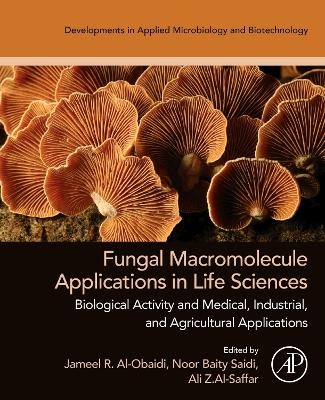
Fungal Macromolecule Applications in Life Sciences
Academic Press Inc (Verlag)
978-0-443-30102-5 (ISBN)
- Noch nicht erschienen (ca. Juni 2025)
- Versandkostenfrei innerhalb Deutschlands
- Auch auf Rechnung
- Verfügbarkeit in der Filiale vor Ort prüfen
- Artikel merken
Dr. Jameel R. Al-Obaidi obtained his PhD in Molecular biology from the University of Malaya, Malaysia. After completing his PhD, Dr jameel works for 7 years at the National Institutes of Biotechnology, Ministry of Science, Technology and Innovation, Malaysia as a senior research officer and then research director. He is currently a lecturer at the Department of Biology, Faculty of Sciences and Mathematics, Universiti Pendidikan Sultan Idris. Dr. Jameel Current research interests include but are not limited to research in Molecular biology, proteomics, protein markers, metabolomics, bioinformatics, plant disease and edible mushroom research. He has published more than 50 scientific articles in peer-reviewed journals and contributed to 6 books. He has received local and international grants. He is involved in a number of national and international research projects around the world. Currently, Dr. Jameel serves as an editor in PLOS One, BMC Molecular and Cell Biology, PEERJ and Journal of Tropical Medicine, he is also a reviewer of several high-impact international scientific journals Assoc. Prof. Dr. Noor Baity Saidi obtained her PhD in Molecular Plant Science from the University of Edinburgh, United Kingdom, on the interaction between the model plant, Arabidopsis thaliana, and the bacterial pathogen Pseudomonas syringae pv. tomato DC3000. She is currently a lecturer at the Faculty of Biotechnology and Biomolecular Sciences, Universiti Putra Malaysia. Dr. Noor Baity uses molecular tools and next-generation sequencing to examine plant-pathogen interactions and develop biocontrol formulations targeting various plant diseases. She has published more than 30 scientific articles in peer-reviewed journals, including Scientific Reports, Agronomy, Frontiers in Plant Science, and Microbial Ecology. She has received numerous government and industry grants at the national and international levels, including the Australian Centre for International Agricultural Research. Proffesor Dr. Ali Z. Al-Saffar (PhD), a professor, biotechnologist, toxicologist, and cell biologist, working on different disciplines related to cancer research, drug delivery and nanobiotechnology. Dr. Ali is presently working as a professor at Al-Nahrain University, College of Biotechnology, Dept. of Molecular and Medical Biotechnology. After completing his PhD study from al-Nahrain University – College of Science (Biotechnology) in 2010, he has worked as assistant professor at Al-Nahrain University, College of Science, Dept. of Biotechnology. Later, he joined Florida State University and worked as a post-doctoral fellow in 2011. In 2015, he was reassigned to work at Al-Nahrain University, College of Biotechnology, Dept. of Molecular and Medical Biotechnology and was promoted to professorship in 2021. Dr. Ali has more than 17 years of teaching and research experience in cancer biology, biotechnology, cytogenetics, toxicology as well as nanobiotechnology.
1. Introduction to Macromolecules: Techniques for Fungal Macromolecule Isolation, Characterization, Structural, and Functional Characteristics
2. Bioactivity of fungal macromolecules pharmaceuticals and nutraceuticals
3. Unlocking the Potential of Fungal Extracts as Inhibitors of Bacterial Biofilm Formation
4. Antimicrobial and antifungal properties of fungal macromolecules
5. Fungal Macromolecules as Anti-Cancer Agents: A Powerful Tool for Cancer Treatment
6. A Closer Look at Fungal Metabolism and Anti-Diabetes in Traditional Medicine
7. Exploring the Intersection of Fungal Products and Human Immunology
8. Health-Stimulating Properties of Medicinal Fungi and Their Bioactive Benefits treat Cardiovascular and Respiratory Diseases
9. Fungal macromolecules in drug delivery systems
10. Fungal microbiota-related macromolecules and their relation to human health AGRICULTURAL
11. Beneficial Fungal macromolecules: Molecular perspective in Plant Disease management
12. Revolutionizing Biomedical Applications with fungal derived Protein-Based Nanocomposites
13. Biological control of weeds, herbicides, nematodes, and insects using fungal macromolecules.
14. Fungal macromolecules and nanoparticles synthesis: The role in crop development INDUSTRIAL
15. Fungal Enzymes Production Through the Utilization of by-product
16. Disclosing and remodel fungal macromolecules through in silico analysis
17. Potential applications of Myco-macromolecules as biosurfactants in the petroleum Industry
18. Macromolecules from the fungal origin and their role in the development and production of sustainable and functional food
| Erscheint lt. Verlag | 1.6.2025 |
|---|---|
| Reihe/Serie | Developments in Applied Microbiology and Biotechnology |
| Verlagsort | San Diego |
| Sprache | englisch |
| Maße | 191 x 235 mm |
| Themenwelt | Naturwissenschaften ► Biologie ► Mikrobiologie / Immunologie |
| Naturwissenschaften ► Biologie ► Mykologie | |
| ISBN-10 | 0-443-30102-6 / 0443301026 |
| ISBN-13 | 978-0-443-30102-5 / 9780443301025 |
| Zustand | Neuware |
| Haben Sie eine Frage zum Produkt? |
aus dem Bereich


